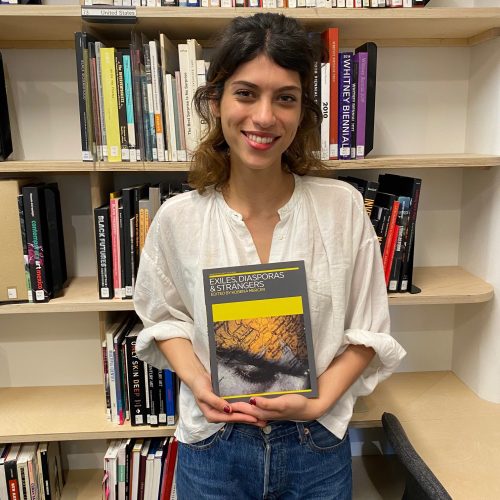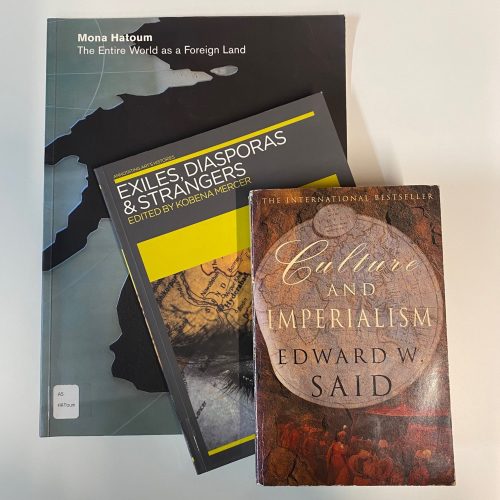
Loulwah Kutbi with publication Exiles, Diasporas & Strangers
Stuart Hall library volunteer Loulwah Kutbi reflects on her experience of migration, sharing her thoughts about the library space and constructions of identity as read in iniva’s 2008 publication Exiles, Diasporas and Strangers.
I often find myself identifying with Edward Said’s interpretation of György Lukács’s meditation on the modern novel as the literary site of “transcendental homelessness”; as a representation of displacement that actively engages with creative expression or passionate research because “the exile’s life is taken up with compensating for disorienting loss by creating a new world” (Said, 2013: p.181). Standing at the threshold of various national constructions – ethnically Turkic, culturally Arab – I have always found articulating identity around national frameworks to be compromising. I came to the UK in 2019 to pursue my undergraduate degree in French and Politics; at the dawn of Brexit and not too long after, the pandemic. Moving to London made me feel a sense of disillusionment that heightened my sense of foreignness. Although migrating was a conscious choice that I chased for the longest time, I noticed how the political and social dynamics framing the discourse around migration did not acknowledge the different gradations of migration and its fundamentally violent urge to occult subjects. Despite the best of intentions to support those not integrated into the system, something felt amiss to me within social and cultural spaces.
The library space was somewhat of an abstract concept for me growing up, being used to owning books brought by family elders who travelled abroad or shipped over from neighbouring Amman. My political awakening, so to say, was an ironic product of modernity’s fruits: (e)commerce and globalisation. I felt as if my life in the city port of Jeddah – west of Saudi Arabia – was surging so readily into the future without dealing with the paradoxes of its current situation or inherited history. This opacity forged a feeling of cultural amnesia.
I asked Library Manager Tavian Hunter whether Stuart Hall ever wrote about the notion of a diaspora within a diaspora, on being exiled but from within the borders of a homeland, who then led me to iniva’s Exiles, Diasporas and Strangers. Reading through the essays of the contributors, I approached the book as an encounter. I closely read the works of Stuart Hall and Edward Said inscribed within spatiotemporal circumstances that drew me towards a space like Stuart Hall Library and realised that my time spent at the library allowed me to bridge what I once viewed as parallel universes, the often sanitised realm of theory and the emotionally affective or social realm of visual expression. Perhaps, the guiding question was (the root from which my cultural amnesia sprouted): How can one speak from experiences rather than for them?

Books by Edward W. Said, Kobena Mercer and Mona Hatoum
Even though it is obvious to state that it’s impossible to fully represent any cultural experience, negotiating how the politics of representation manifest in the works of diasporic artists has helped me reclaim and re-imagine a different conception of identity. Reading Jean Fisher’s essay, especially the section Memory: Womb of History (Fisher, 2008: p.206) has helped me understand how remembrance and memory can intervene against censored or official histories. I realised how central documenting and validating lived experiences are in resisting the day-to-day alienation perpetrated by the commodification of culture. Problematising the construction of “finished” or “whole” identities urges one to think about the possibilities that can emerge from such intellectual/creative departures. I especially resonated with the figurative works of Mona Hatoum and the filmic practices of the BLK group, as they allowed me to understand how nostalgia can be harnessed as a transgressive and productive force. Researching visual culture within the framework of memory studies in the library has helped me reconcile my emotional and professional sensibilities, to understand how to work around the silences and unravelings of living through/by translation. Above all, it made me see the recuperative properties of research (both personally and communally) as I progress into my postgraduate studies this fall.
Iniva continuously seeks to respond to the aliments of our postmodern, capital consumed present. Its efforts to publish, maintain and represent such complex artistic/curatorial practices echo Stuart Hall, who comment on the post-modern turn and its proclamations surrounding the death of the “subject”: “Now in the postmodern age, you all feel so dispersed, I become centred. What I’ve thought as dispersed and fragmented comes, paradoxically, to be the representative of the modern experience!” (Hall, 1987: 44)
Biography
Loulwah Kutbi is a final year Politics and Languages student at Birkbeck, University of London. She has been volunteering at the Stuart Hall Library since February 2022.
References
Said, E. W. (2012). Reflections on exile and other literary and cultural essays. London: Granta.
Fisher, J. (2008). “Diaspora, trauma and the poetics of rememberance”, in: Mercer, K. (ed.), Exiles, diasporas and strangers. (2008). London: Iniva (Institute of International Visual Arts), pp.190-212.
Appignenesi, L. (ed.) (1987). The real me: Postmodernism and the question of identity. London: Institute of the Contemporary Arts.